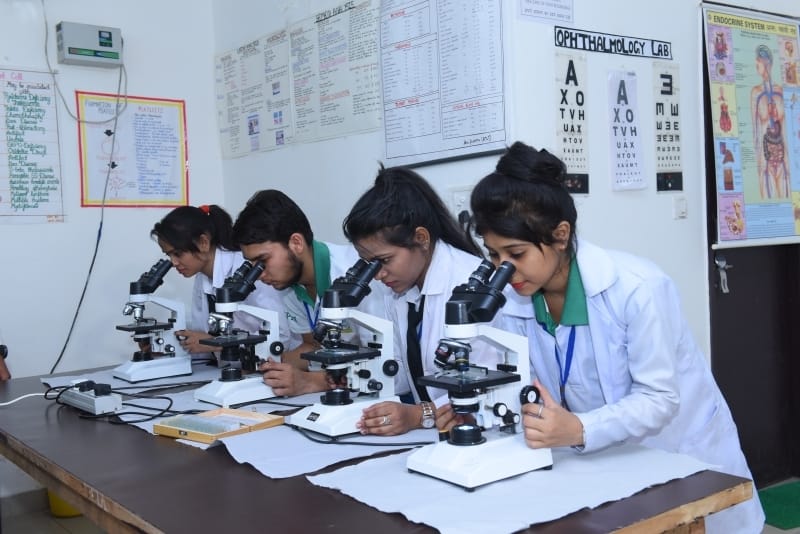Bachelor's in Medical Laboratory Technology
Bachelor’s in Medical Laboratory Technology (BMLT) is an undergraduate program that focuses on the theoretical and practical aspects of medical laboratory sciences. It is designed to equip students with the necessary knowledge and skills to work as competent and proficient laboratory professionals in the healthcare industry.
During the BMLT program, students gain a comprehensive understanding of various medical laboratory disciplines, including clinical biochemistry, microbiology, hematology, histopathology, immunology, and molecular biology. They learn about the principles, procedures, and techniques used in the analysis and diagnosis of diseases, as well as the proper handling of laboratory equipment and specimens.
The curriculum of a BMLT program typically includes both theoretical classroom lectures and hands-on practical training in well-equipped laboratories. Students learn about laboratory safety protocols, quality control measures, data interpretation, and effective communication skills necessary for interacting with healthcare professionals and patients.

The program emphasizes the application of scientific principles and critical thinking in laboratory analysis. Students learn to perform a wide range of laboratory tests, analyze and interpret the results, and generate accurate reports. They are also trained to operate and maintain sophisticated laboratory instruments and equipment used in diagnostic testing.
Apart from the technical skills, the BMLT program also emphasizes the importance of ethics, professionalism, and adherence to legal guidelines in the laboratory setting. Students learn about patient confidentiality, data management, and the ethical responsibilities associated with working in a healthcare environment.
After completing a BMLT program, graduates can pursue various career paths in the medical laboratory field. They can work in hospitals, diagnostic laboratories, research institutes, public health laboratories, blood banks, or pharmaceutical companies. Graduates may also choose to specialize in specific areas of medical laboratory technology, such as clinical biochemistry, microbiology, or histopathology, through further education and training.
Furthermore, with the advancements in healthcare technology and research, there is a growing demand for skilled medical laboratory professionals. The BMLT program provides a strong foundation for those who wish to pursue higher education or research opportunities in the field of medical laboratory sciences.
In summary, a Bachelor’s in Medical Laboratory Technology offers a comprehensive education in the principles, techniques, and practices of medical laboratory sciences. It prepares students to work as competent laboratory professionals, contributing to accurate diagnoses, patient care, and advancements in healthcare.
Future Career Options after Bachelor's in Medical Laboratory Technology
After completing a BMLT program, you can explore a variety of career options in the field of medical laboratory technology. Some common career paths include working as a medical laboratory technologist, laboratory supervisor, laboratory manager, research assistant, quality control analyst, or technical consultant in hospitals, diagnostic laboratories, research institutes, pharmaceutical companies, or public health agencies.
Yes, after completing a BMLT program, you can choose to specialize in specific areas of medical laboratory technology based on your interests and career goals. Specialization options may include clinical biochemistry, microbiology, hematology, histopathology, immunology, molecular biology, or cytogenetics. Specialization can enhance your expertise and open up advanced career opportunities in your chosen area.
Yes, you can pursue higher education or postgraduate studies after completing a BMLT. Options may include Master’s programs in Medical Laboratory Technology, Biotechnology, Public Health, or related fields. Higher education can provide you with advanced knowledge, research opportunities, and potential career advancement in academia, research, or specialized laboratory roles.
Yes, there are opportunities for research and development in the field of medical laboratory technology. You can engage in research projects related to diagnostics, disease mechanisms, emerging technologies, or quality improvement in laboratory practices. Pursuing higher education or collaborating with research institutions can further enhance your research prospects.
Yes, a BMLT graduate can work in the field of public health, especially in laboratory settings that focus on disease surveillance, outbreak investigation, epidemiology, or public health research. Such roles contribute to monitoring and preventing the spread of diseases, promoting public health initiatives, and ensuring the quality of laboratory testing in public health programs.
Yes, medical laboratory technology professionals with a BMLT degree may find international employment opportunities. However, specific requirements, certifications, and licensing may vary across countries. It is advisable to research the destination country’s regulations, fulfill any additional requirements, and possibly pursue international certifications to increase your employability abroad.
Yes, after gaining experience and higher qualifications, you can pursue teaching or academic positions in medical laboratory technology. These roles can be in colleges, universities, or vocational training institutes, where you can contribute to educating the next generation of medical laboratory professionals and engage in research and curriculum development.
To stay updated with advancements in medical laboratory technology, you can join professional organizations or associations related to the field. Attend conferences, workshops, and seminars, and participate in continuing education programs. Engage in networking, read scientific journals, and follow reputable online resources to keep abreast of the latest research, technology, and industry trends.
Yes, the field of medical laboratory technology offers opportunities for professional growth and specialization. Continuous professional development, acquiring advanced certifications, pursuing higher education, and staying updated with emerging technologies and techniques can lead to career advancement, leadership roles, and specialized positions within the field.
Job opportunities can be found through various channels, including online job portals, healthcare institution websites, professional networks, and recruitment agencies. Stay connected with alumni networks, attend job fairs, and actively engage in networking to increase your chances of finding suitable job opportunities.
Please note that specific career opportunities may vary based on factors such as location, market demand, and individual preferences. It is advisable to conduct thorough research, explore various career paths, and seek guidance from professionals in the field to make informed decisions regarding your future career after completing a Bachelor’s in Medical Laboratory Technology.


